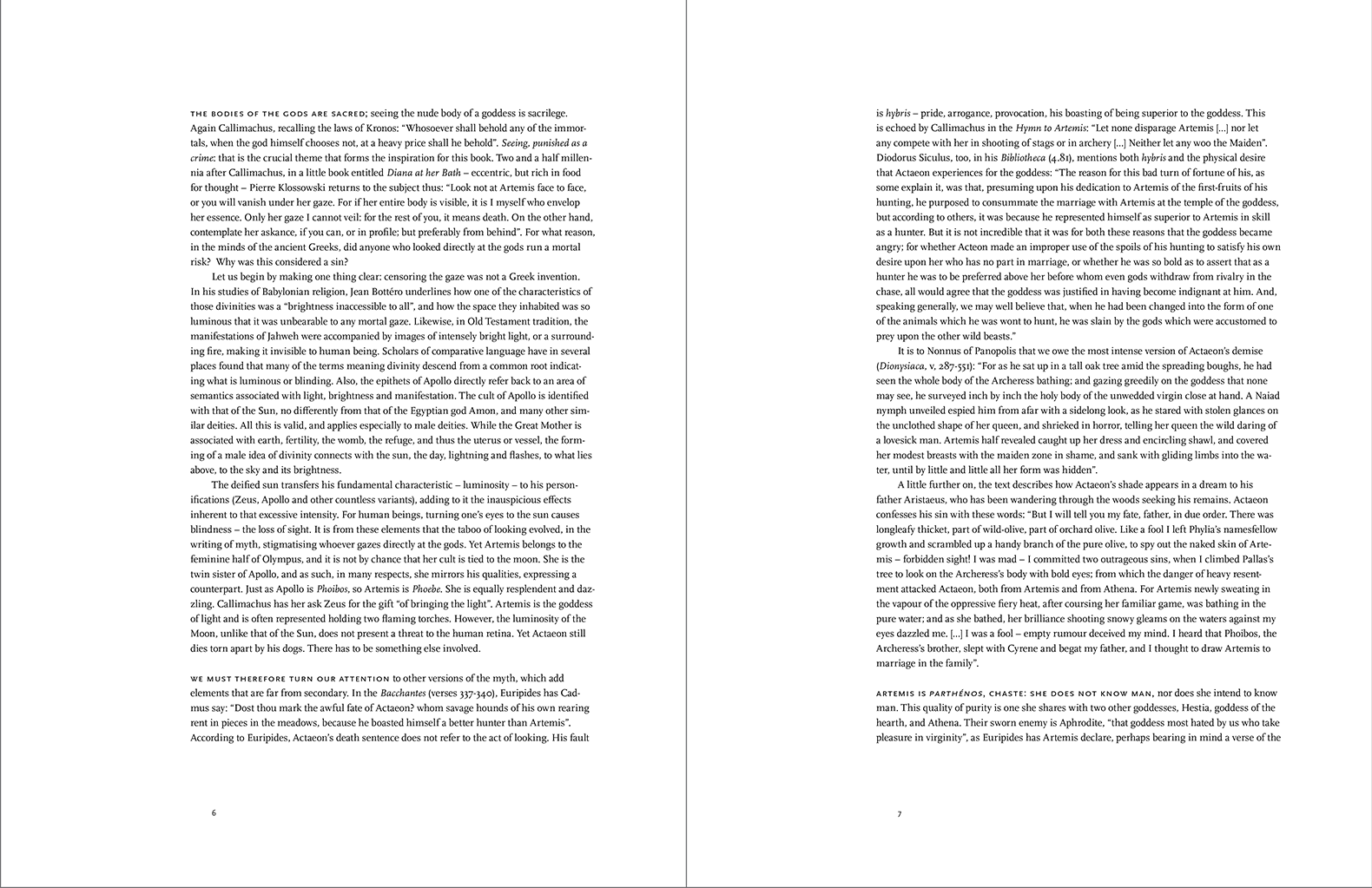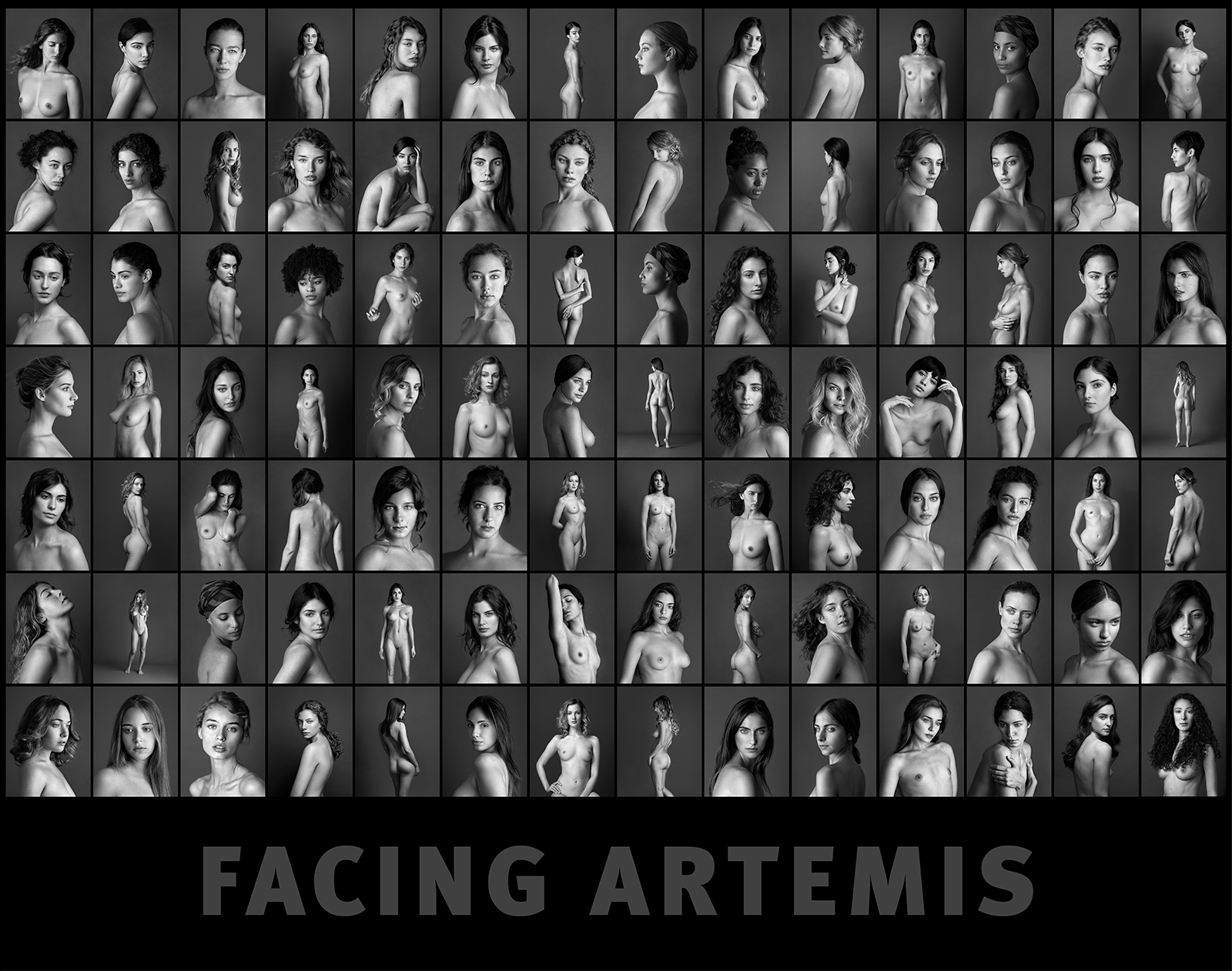Facing Artemis
Click here to order your copy
















“Muse, sing of Artemis, sister of the Far-shooter, the virgin who delights in arrows, who was fostered with Apollo”: thus opens the first of the two Homeric Hymns dedicated to the goddess. She excels “supreme among the immortals both in thought and in deed”, continues the second Hymn: Artemis, “whose shafts are of gold, who cheers on the hounds, the pure maiden, shooter of stags, who delights in archery, own sister to Apollo with the golden sword. Over the shadowy hills and windy peaks she draws her golden bow, rejoicing in the chase, and sends out grievous shafts. The tops of the high mountains tremble and the tangled wood echoes awesomely with the outcry of beasts: earthquakes and the sea also where fishes shoal. But the goddess with a bold heart turns every way destroying the race of wild beasts”. Four centuries later, during the first half of the third century before Christ, Callimachus imagined her as an adolescent, on the lap of Zeus. She makes a request of him: “Give me to keep my maidenhood, Father, forever: and give me to be of many names, that Phoebus may not vie with me. And give me arrows and a bow […] But give me to be Bringer of Light and give me to gird me in a tunic with embroidered border reaching to the knee, that I may slay wild beasts. And give me sixty daughters of Oceanus for my choir – all nine years old, all maidens yet ungirdled; and give me for handmaidens twenty nymphs of Amnisus who shall tend well my buskins, and, when I shoot no more at lynx or stag, shall tend my swift hounds. And give to me all mountains; and for city, assign me any, even whatsoever thou wilt: for seldom is it that Artemis goes down to the town. On the mountains will I dwell and the cities of men I will visit only when women vexed by the sharp pang of childbirth call me to their aid”.
Of the many stories of Artemis, we shall address only one on this occasion: her deadly, fortuitous encounter with Actaeon. It forms a myth that already enjoyed widespread popularity in ancient times, and we now know it through several literary variants and numerous figurative representations. The best-known textual version is found in Ovid’s Metamorphoses. During a hunting expedition, the Latin poet tells us, Actaeon, son of the King of Thebes, “wandering through the unfamiliar woods with unsure footsteps”, reaches a clearing, where there is a grotto of extraordinary beauty, and a spring. He arrives there by chance: “for so fate would have it” (“sic illum fata ferebant”). It so happens that at that very moment Artemis is bathing in that spring. Her handmaidens have helped her to undress, and are now pouring water over her body from capacious ewers. The naked nymphs and goddess become aware of the man’s presence and, blushing with shame, begin to utter screams. Artemis, writes Ovid, “stood turning aside a little and cast back her gaze; and though she would fain have had her arrows ready, what she had she took up, the water, and flung it into the young man’s face. And as she poured the avenging drops upon his hair, she spoke these words foreboding his coming doom: ‘Now you are free to tell that you have seen me all unrobed – if you can tell’.” Actaeon is transformed into a stag by the furious goddess: his arms become legs, antlers begin to emerge on his head, and his body is covered with a dappled fur. Actaeon falls prey to terror. He flees, and is amazed at his own speed. He wants to scream, but can only bell, like a deer. Sensing him as prey, his pack of hounds begins to follow him, and they soon block his path and tear him to pieces. Torn apart by his own dogs: that is the horrendous end of Actaeon, guilty – according to Ovid – of having seen Artemis naked, by chance.
The bodies of the gods are sacred; seeing the nude body of a goddess is sacrilege. Again Callimachus, recalling the laws of Kronos: “Whosoever shall behold any of the immortals, when the god himself chooses not, at a heavy price shall he behold”. Seeing, punished as a crime: that is the crucial theme that forms the inspiration for this book.